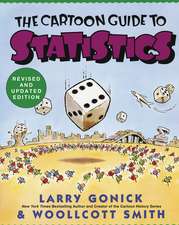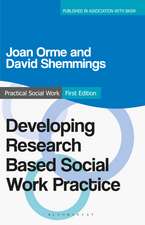Methodological Thinking: Basic Principles of Social Research Design
Autor Donileen R. Losekeen Limba Engleză Paperback – 14 apr 2016
The Second Edition includes a revised chapter on research foundations, with focus on the philosophy of science and ethics; an emphasis on critical thinking; additional attention to evaluating research; and a new selection of briefer, multidisciplinary journal articles designed to be accessible to a wide variety of readers.
Preț: 437.63 lei
Preț vechi: 514.86 lei
-15% Nou
Puncte Express: 656
Preț estimativ în valută:
83.74€ • 87.65$ • 69.70£
83.74€ • 87.65$ • 69.70£
Carte tipărită la comandă
Livrare economică 01-15 aprilie
Preluare comenzi: 021 569.72.76
Specificații
ISBN-13: 9781506304717
ISBN-10: 1506304710
Pagini: 208
Dimensiuni: 152 x 229 x 22 mm
Greutate: 0.27 kg
Ediția:Second Edition
Editura: SAGE Publications
Colecția Sage Publications, Inc
Locul publicării:Thousand Oaks, United States
ISBN-10: 1506304710
Pagini: 208
Dimensiuni: 152 x 229 x 22 mm
Greutate: 0.27 kg
Ediția:Second Edition
Editura: SAGE Publications
Colecția Sage Publications, Inc
Locul publicării:Thousand Oaks, United States
Recenzii
Methodological Thinking is a highly accessible, practical guide to the often-intimidating process of designing a research project. An excellent starting point for an undergraduate course in social research fundamentals, full of useful examples and uncomplicated explanations of the starting stages of the research process.
This concise, approachable book with clear examples from published articles is a useful supplement to long, detailed, technical methodology texts that students sometimes find overwhelming and inaccessible.
The second edition of Methodological Thinking has only improved upon the first edition, by focusing more attention on critical issues related to sampling and ethics, along with a broader examination of the epistemology underlying social science research. This book is useful as a “go-to” reference on designing social science research and is excellent as a primary text at all levels of college.
Methodological Thinking helps students move past their preconceptions of research to critically engage in research design while enhancing skills that will help them evaluate information in their daily lives.
This concise, approachable book with clear examples from published articles is a useful supplement to long, detailed, technical methodology texts that students sometimes find overwhelming and inaccessible.
The second edition of Methodological Thinking has only improved upon the first edition, by focusing more attention on critical issues related to sampling and ethics, along with a broader examination of the epistemology underlying social science research. This book is useful as a “go-to” reference on designing social science research and is excellent as a primary text at all levels of college.
Methodological Thinking helps students move past their preconceptions of research to critically engage in research design while enhancing skills that will help them evaluate information in their daily lives.
Cuprins
1. Exploring the World of Social Research Design
Defining Social Research
The Study of Social Research Design
Evaluating Social Research
Methodological Thinking
Studying Research Design as Methodological Thinking
Methods in Theory and in Practice
2. Foundations
Foundation I: Data, Concepts, and Theory
Foundation II: The Logic of Relationships Between Data and Concepts/Theory
Foundation III: Philosophies of Science
The Qualitative Versus Quantitative Debate
Foundations and Research Design
3. Research Questions
Characteristics of Appropriate Research Questions
Identifying Research Questions in Published Research
Creating Research Questions
Thinking Ahead: Developing Questions That Will Be Ethical and Practical to Study
Revising Research Questions
Evaluating Research Questions
Research Questions and Research Design
4. Literature Reviews
Defining "The Literature"
Existing Knowledge as Tools for Research Design
Defining the Relevant Literature
Thinking About the Review Task
The Contents and Form of Literature Reviews
Evaluating Literature Reviews
Literature Reviews and Research Design
Examples of Social Research Article Databases
5. Measurement
Conceptualization and Conceptual Definitions
Operationalization and Operational Definitions
Conceptualization and Operationalization in Research Led by Inductive Reasoning
Measurement Problems in Social Research
Evaluating Measurement
Measurement and Research Design
6. Data Generation Techniques
Research Questions and Data
Data Generation Techniques
Planning Ahead
Data Generation Techniques and Research Design
7. Samples
Populations and Samples in Social Research
The Importance of Samples in Social Research
Probability Samples
Non-probability Samples
Evaluating Samples in Published Research
Samples and Research Design
8. Summary: Thinking About Social Research Design
Foundations of Research Design and Evaluation: Methodological Thinking
Evaluating Research Design: Variations
Assessing Research Quality
Characteristics of High-Quality Reports of Research Design
Ending and Beginnings
Appendix: Suggestions for Further Reading
Appendix: Articles Used as Examples
Defining Social Research
The Study of Social Research Design
Evaluating Social Research
Methodological Thinking
Studying Research Design as Methodological Thinking
Methods in Theory and in Practice
2. Foundations
Foundation I: Data, Concepts, and Theory
Foundation II: The Logic of Relationships Between Data and Concepts/Theory
Foundation III: Philosophies of Science
The Qualitative Versus Quantitative Debate
Foundations and Research Design
3. Research Questions
Characteristics of Appropriate Research Questions
Identifying Research Questions in Published Research
Creating Research Questions
Thinking Ahead: Developing Questions That Will Be Ethical and Practical to Study
Revising Research Questions
Evaluating Research Questions
Research Questions and Research Design
4. Literature Reviews
Defining "The Literature"
Existing Knowledge as Tools for Research Design
Defining the Relevant Literature
Thinking About the Review Task
The Contents and Form of Literature Reviews
Evaluating Literature Reviews
Literature Reviews and Research Design
Examples of Social Research Article Databases
5. Measurement
Conceptualization and Conceptual Definitions
Operationalization and Operational Definitions
Conceptualization and Operationalization in Research Led by Inductive Reasoning
Measurement Problems in Social Research
Evaluating Measurement
Measurement and Research Design
6. Data Generation Techniques
Research Questions and Data
Data Generation Techniques
Planning Ahead
Data Generation Techniques and Research Design
7. Samples
Populations and Samples in Social Research
The Importance of Samples in Social Research
Probability Samples
Non-probability Samples
Evaluating Samples in Published Research
Samples and Research Design
8. Summary: Thinking About Social Research Design
Foundations of Research Design and Evaluation: Methodological Thinking
Evaluating Research Design: Variations
Assessing Research Quality
Characteristics of High-Quality Reports of Research Design
Ending and Beginnings
Appendix: Suggestions for Further Reading
Appendix: Articles Used as Examples
Notă biografică
Descriere
With a new discussion on the philosophy of science and an expanded focus on research ethics and sampling, this second edition continues to give readers an interdisciplinary account of the logic of social science research









